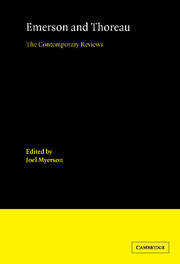A Week on the Concord and Merrimack Rivers (1849)
Published online by Cambridge University Press: 23 March 2010
Summary
A really new book—a fresh, original, thoughtful work—is sadly rare in this age of omniferous publication. Mr. Thoreau's, if not entirely this, is very near it. Its observations of Nature are as genial as Nature herself, and the tones of his harp have an Æolian sweetness. His reflections are always striking, often profoundly truthful, and his scholastic treasures, though a little too ostentatiously displayed, are such as the best instructed reader will enjoy and thank him for. His philosophy, which is the Pantheistic egotism vaguely characterised as Transcendental, does not delight us. It seems second-hand, imitative, often exaggerated—a bad specimen of a dubious and dangerous school. But we will speak first of the staple of the work.
Mr. Thoreau is a native and resident of Concord, Mass.—a scholar, a laborer, and in some sort a hermit. He traveled somewhat in his earlier years (he is still young), generally trusting to his own thoughts for company and his walking-cane for motive power. It would seem a main purpose of his life to demonstrate how slender an impediment is poverty to a man who pampers no superfluous wants, and how truly independent and self-sufficing is he who is in no manner the slave of his own appetites. Of his fitful hermit life and its results we have already given some account: Now for his ‘Week on the Concord and Merrimac.’
- Type
- Chapter
- Information
- Emerson and ThoreauThe Contemporary Reviews, pp. 341 - 370Publisher: Cambridge University PressPrint publication year: 1992



